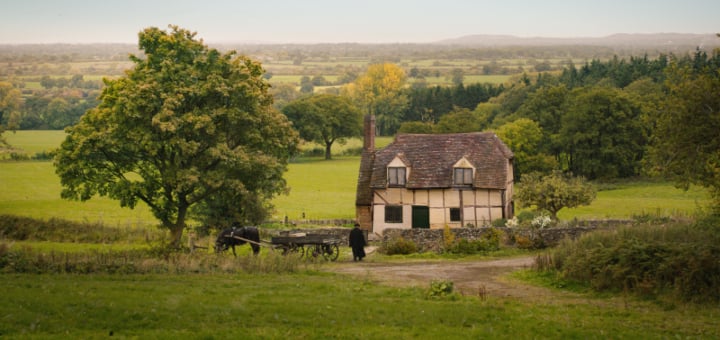
 Copyright 2019 20th Century Fox Film Company. All rights reserved. Used with permission.[/caption]
When I watch a film I also measure what happens to my attitude afterwards. Do I suddenly feel I can take on the world after a superhero movie? Do I want to change the world? One of the themes of the new Tolkien movie is just that. His fellowship of friends come together to change the world. I will share why comfort was my overall feeling at the end of the movie later.
This movie highlights Tolkien’s younger years, beginning with his move to England with his mother and younger brother (I didn’t realize he was born in Bloemfontein, South Africa). When they move from the idyllic English country-side to the industrial city we are reminded of Bilbo Baggins leaving Hobbiton for his great adventure. Tolkien’s war years are interspersed with these growing years. Images from his award winning Lord of the Rings epic begin to emerge.
As Mabel Tolkien homeschooled her two sons, they learned Latin and shared imaginative stories. Her influence is prominent throughout the film even though she died young. She helped John Robert Reuel and Hilary Arthur Tolkien make sense of the difficult times they faced. Mabel joined the Catholic Church, imparting the gift of faith to her boys. She entrusted their upbringing to Father Francis Xavier Morgan of the Birmingham Oratory (founded by Cardinal John Newman, who was beatified by Pope Benedict XVI in 2010). After Mabel died the boys moved to a boarding house near the Oratory. The matron of the boarding house provided a home for Robert, Hilary and another boarder, Edith Mary Bratt.
Copyright 2019 20th Century Fox Film Company. All rights reserved. Used with permission.[/caption]
When I watch a film I also measure what happens to my attitude afterwards. Do I suddenly feel I can take on the world after a superhero movie? Do I want to change the world? One of the themes of the new Tolkien movie is just that. His fellowship of friends come together to change the world. I will share why comfort was my overall feeling at the end of the movie later.
This movie highlights Tolkien’s younger years, beginning with his move to England with his mother and younger brother (I didn’t realize he was born in Bloemfontein, South Africa). When they move from the idyllic English country-side to the industrial city we are reminded of Bilbo Baggins leaving Hobbiton for his great adventure. Tolkien’s war years are interspersed with these growing years. Images from his award winning Lord of the Rings epic begin to emerge.
As Mabel Tolkien homeschooled her two sons, they learned Latin and shared imaginative stories. Her influence is prominent throughout the film even though she died young. She helped John Robert Reuel and Hilary Arthur Tolkien make sense of the difficult times they faced. Mabel joined the Catholic Church, imparting the gift of faith to her boys. She entrusted their upbringing to Father Francis Xavier Morgan of the Birmingham Oratory (founded by Cardinal John Newman, who was beatified by Pope Benedict XVI in 2010). After Mabel died the boys moved to a boarding house near the Oratory. The matron of the boarding house provided a home for Robert, Hilary and another boarder, Edith Mary Bratt.
 (From L-R): Nicholas Hoult, Patrick Gibson, Tom Glynn-Carney and Anthony Boyle in the film TOLKIEN. Photo Courtesy of Fox Searchlight Pictures. © 2019 Twentieth Century Fox Film Corporation All Rights Reserved[/caption]
Fr. Francis made sure the Tolkien brothers had the best education. He sent them to attend King Edward’s School in Birmingham. At this school young Tolkien struggled to fit in until he meets his “fellowship.” War scenes become more prominent in the film, and ringwraiths, orcs, and dragons take imaginative shape in the horrors surrounding Tolkien. Look for this moment in the film: through the smoke of battle a crucifix appears. I take it as a reminder that evil has already been overcome even as it closes in on Tolkien to destroy his fellowship of friends. As he awakes in a hospital after the war, Edith Bratt is there, his first and only love who inspired Lúthien in the Silmarillion. In this movie we see their love tested as it was for Lúthien and Beren.
As with every good movie, you see what you bring to it. I could mine this film a few more times for treasures. Another take away from good movies are movie quotes: “A word without meaning is only a sound,” is the conclusion of an explanation on the deeper meaning of words by Tolkien’s philology professor. Another memorable line is spoken by Fr. Francis. He realizes there are no words to console people after the war, “Words are useless. I speak the Liturgy. There is a comfort in ancient things.” This reminds me of a quote from Vatican II’s Dei Verbum:
(From L-R): Nicholas Hoult, Patrick Gibson, Tom Glynn-Carney and Anthony Boyle in the film TOLKIEN. Photo Courtesy of Fox Searchlight Pictures. © 2019 Twentieth Century Fox Film Corporation All Rights Reserved[/caption]
Fr. Francis made sure the Tolkien brothers had the best education. He sent them to attend King Edward’s School in Birmingham. At this school young Tolkien struggled to fit in until he meets his “fellowship.” War scenes become more prominent in the film, and ringwraiths, orcs, and dragons take imaginative shape in the horrors surrounding Tolkien. Look for this moment in the film: through the smoke of battle a crucifix appears. I take it as a reminder that evil has already been overcome even as it closes in on Tolkien to destroy his fellowship of friends. As he awakes in a hospital after the war, Edith Bratt is there, his first and only love who inspired Lúthien in the Silmarillion. In this movie we see their love tested as it was for Lúthien and Beren.
As with every good movie, you see what you bring to it. I could mine this film a few more times for treasures. Another take away from good movies are movie quotes: “A word without meaning is only a sound,” is the conclusion of an explanation on the deeper meaning of words by Tolkien’s philology professor. Another memorable line is spoken by Fr. Francis. He realizes there are no words to console people after the war, “Words are useless. I speak the Liturgy. There is a comfort in ancient things.” This reminds me of a quote from Vatican II’s Dei Verbum:
Deeds and words having an inner unity: the deeds wrought by God in the history of salvation manifest and confirm the teaching and realities signified by the words, while the words proclaim the deeds and clarify the mystery contained in them ( 2).This film gives me gratitude for what and who inspired Tolkien’s genius as he wrote his epic high-fantasies: the people in his life, his Catholic faith and love of Liturgy, the influence of his mother, wife, friends and children. Tolkien wrote to make sense of changes in the world. For this reason comfort was my overall feeling as the film credits rolled across the screen. It may seem an odd response to a biographical film that also recounts a horrendous World War, loss, death and disappointment. Comfort is a Middle English word that means to strengthen mentally and spiritually, to support, cheer up, to console when in grief and trouble.
In a hole in the ground there lived a hobbit. Not a nasty, dirty, wethole, filled with the ends of worms and an oozy smell, nor yet a dry, bare, sandy hole with nothing in it to sit down on or to eat: it was a hobbit-hole, and that means comfort (The Hobbit). Comfort, comfort my people, says my God (Isaiah 40). God comforts us in all our troubles, so that we can comfort those in any trouble with the comfort we ourselves have received from God (2 Corinthians 1).https://youtu.be/Girzu81oS8Q See the movie two or more times with your over-PG 13 crowd. Have The Hobbit and Lord of the Rings at hand when you return from the theater! This new Tolkien movie is a gift for life’s unexpected journeys.
Copyright 2019 Sr. Margaret Kerry, fsp
About the Author

Sr. Margaret Kerry, fsp
A Daughter of St. Paul for 40 years Sr. Margaret continues to pursue new ways to proclaim the Gospel: sharing the Pauline Charism with the laity, writing books (St. Anthony of Padua: Fire & Light; Strength in Darkness: John of the Cross; Prayers for the New Evangelization), & through direct evangelization. She is available for workshops on the Vocation & Mission of the Laity, Media Literacy, and The New Evangelization. mkerry@paulinemedia.com


.png?width=1806&height=731&name=CatholicMom_hcfm_logo1_pos_871c_2728c%20(002).png)
Comments